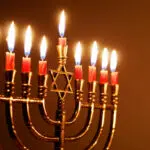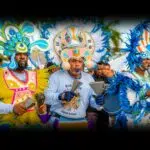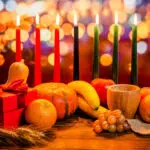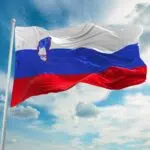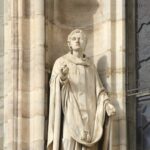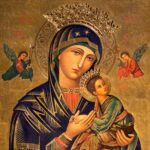History of Kwanzaa
Professor and chairman of Black Studies at California State University, Long Beach, Dr. Maulana Karenga, created Kwanzaa in 1966 in the midst of the Black Freedom Movement, reflecting concerns for cultural grounding in thought and practice. After the Watts riots in L.A., Dr. Karenga looked for ways to strengthen the African-American community. He founded the US Organization, a cultural organization, and started to research African “first fruit” (harvest) celebrations. Karenga combined aspects of several different harvest celebrations, such as those of the Ashanti and those of the Zulu, to form the basis of Kwanzaa.
The name Kwanzaa comes from the phrase “matunda ya kwanza” meaning “first fruits” in Swahili. Swahili is considered a pan-African language, and also happens to be the most widely spoken language in Africa. Basing the language of the holiday in Swahili represents unity throughout the African and Black communities.
The first-fruits celebrations are recorded in African history as far back as ancient Egypt and Nubia and appear in ancient and modern times in other classical African civilizations such as Ashantiland and Yorubaland. Kwanzaa developed as a flourishing branch of the African American life and struggle as a recreated and expanded ancient tradition. It draws from the cultures of various African people and is celebrated by millions of Africans and African Americans throughout the nation.
Each family celebrates Kwanzaa in their own way, but celebrations often include song and dance, African drums, storytelling, poetry readings, and a large traditional meal. On each of the seven nights, the family gathers and a child lights one of the candles on the kinara, then one of the seven principles, called Nguzo Saba, is discussed. These principles are values of African culture which contribute to building and reinforcing community among African Americans.
Kwanzaa timeline
Dr. Maulana Karenga, a professor at California State University, creates Kwanzaa as a response to the Watts riots.
The first Kwanzaa Hallmark card is sold.
Dr. Karenga declares Kwanzaa as a non-religious celebration of family, community, and culture so that people will be able to celebrate both Christmas and Kwanzaa.
Public Policy Polling finds that 12.5 million Americans celebrate Kwanzaa.
Kwanzaa FAQs
What is Kwanzaa and why is it celebrated?
What are the seven principles of Kwanzaa?
What are Kwanzaa traditions?
How to Observe Kwanzaa
Get in the spirit with African decor
No holiday is complete without decorations! To get in the Kwanzaa spirit, decorate your home with African art, cloths such as kente, and fresh fruits that represent African idealism.
Learn some Swahili
Swahili is a language spoken throughout Africa and therefore unites all who celebrate Kwanzaa. One of the most important Swahili words to know are the names of the seven principles of Kwanzaa: Umoja (unity), Kujichagulia (self-determination), Ujima (collective work and responsibility), Ujamaa (cooperative economics), Nia (purpose), Kuumba (creativity), and Imani (faith).
Pick up a drum
Many families celebrate Kwanzaa by playing music and singing cultural African or African-American songs. Pick up a drum, or any percussive instrument brought out for the celebration, and join in on the musical fun!
5 Amazing Facts About Kwanzaa
4% of Americans celebrate it
A study from Public Policy Polling found that 4% of Americans said they celebrate or primarily celebrate Kwanzaa during the holiday season, which is close to Chanukah's 5%, but way less than the 90% who celebrate Christmas — although, 4% of Americans is still over 12.5 million people.
It has grown in popularity
Kwanzaa lasts for seven days and since its inception in 1966, the holiday has grown in impact within the African American community and is recognized as an official holiday — other countries, like Canada, Jamaica, and Brazil, have gained interest in Kwanzaa but don't celebrate it to the extent as America does.
$77 spent on gifts
The average amount spent on Kwanzaa gift shopping per person is about $77 — this is because only children receive gifts for Kwanzaa, which usually consist of a book and a heritage symbol.
Kwanzaa celebs
Celebrities who have been known to celebrate Kwanzaa every year include Oprah, Maya Angelou, Chuck D, Angelina Jolie, and Synthia Saint James (who designed the first Kwanzaa postage stamp.)
The colors of Kwanzaa
The colors of Kwanzaa are black for the people, red for the noble blood that unites all people of African ancestry, and green for the rich land of Africa.
Why Kwanzaa is Important
It promotes unity
Kwanzaa was birthed as a response to the Watts riots, which occurred as a reaction to longstanding racial injustice in America. The holiday was made by Dr. Maulana Karenga to bring African Americans together as a community in a celebration of identity.
It's for the culture
Kwanzaa is considered a cultural holiday rather than a religious celebration, meaning that even if you participate in Kwanzaa festivities, you can still celebrate the winter holidays that fall under your religion. Many households will have both a kinara and a Christmas tree in their living room at the same time.
It allows people to experience a connection to their roots
Many people in the African American community, and other nations of the African diaspora in the Americas, find that Kwanzaa makes them feel closer to their roots. Celebrating a holiday based on ancient African tradition allows participants to experience a grounding connection to Africa.
Kwanzaa dates
| Year | Date | Day |
|---|---|---|
| 2025 | December 26 | Friday |
| 2026 | December 26 | Saturday |
| 2027 | December 26 | Sunday |
| 2028 | December 26 | Tuesday |
| 2029 | December 26 | Wednesday |



